Michigan changing strategies for garbage disposal as some landfills near capacity
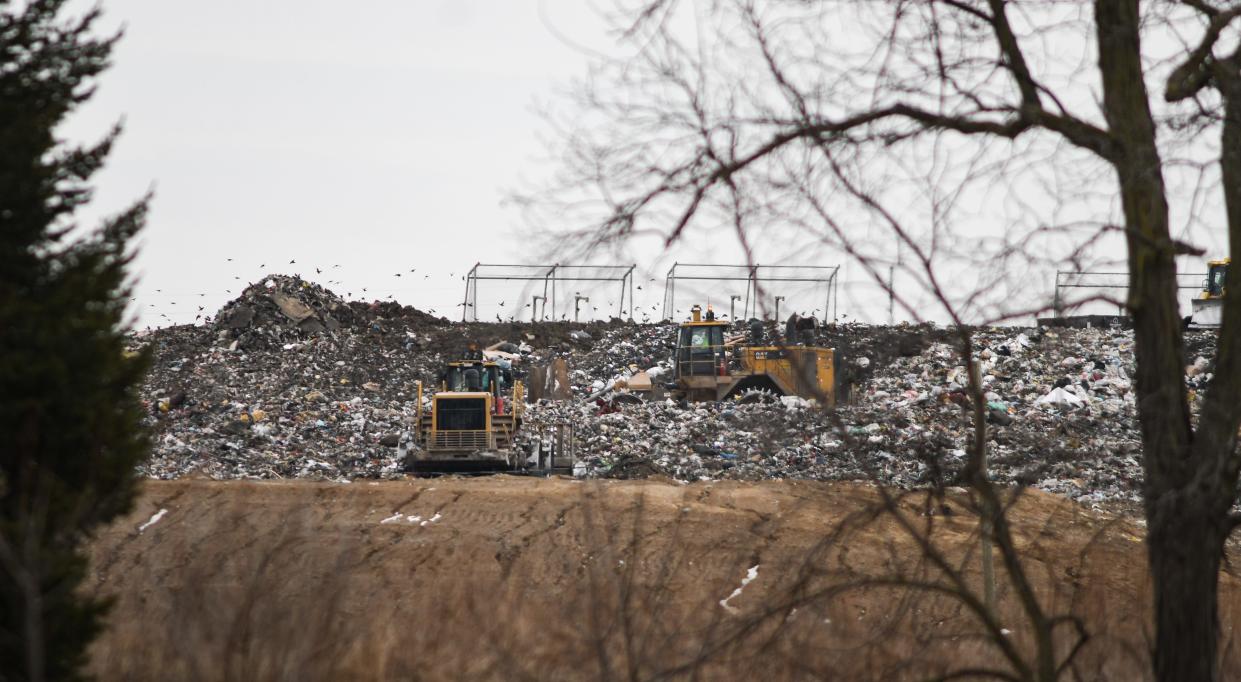
LANSING — Bart Chapin, 70, has lived across from Granger's Grand River Landfill, west of Lansing in Watertown Township, for 13 years. He's more bothered by the truck traffic in recent years than he ever has been by the landfill. He said he isn't terribly worried about plans to expand the landfill.
Chapin said it seems like no one takes care of things anymore and appliances like vacuums are designed to be thrown away rather than repaired, so it makes sense that companies are looking to expand landfills.
"What do we do? We gotta put this stuff somewhere," he said. "I’m not against a landfill, I’m not for it but I’m not against it either. I’d rather have it there than in the city."
The view from his yard is a window to how Michigan will likely deal with disposing of its trash.
Michigan hasn't built a new landfill in more than two decades. That's not likely to change dramatically as new laws supported by the administration of Gov. Gretchen Whitmer make it tougher than ever to build new facilities. Yet existing landfills in populated areas like Lansing and Detroit are nearing their capacity, the state continues to bury record amounts of trash while Michigan recycles only about half as much as the national average.
Parts of Michigan are nearing landfill capacity, signaling that it's time to think about what's next, said Bob Gardner, a landfill consultant with SCS Consultants, which works in a number of states including Ohio, Wisconsin and Texas. He points out that it can often take 10 to 20 years for a landfill to go from concept to taking the first load of waste,
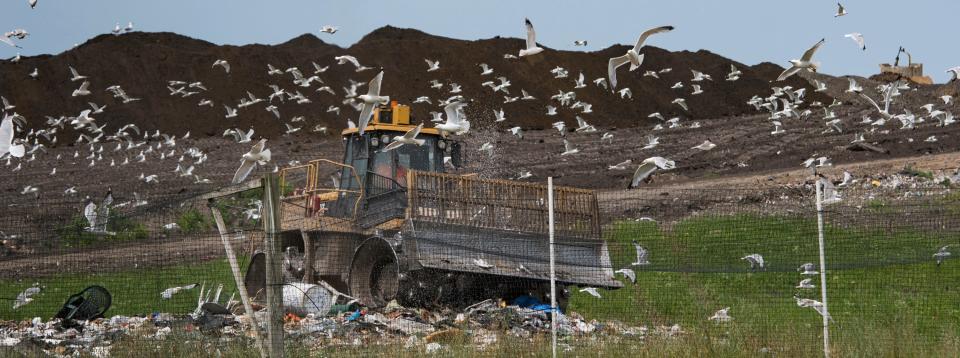
"Most haulers don’t want to transport their waste over 25 to 30 miles, and sometimes less depending on traffic issues," Gardner said. "Doing so results in too much off-route time."
It's a pattern across the country, said Timothy Townsend, a University of Florida professor whose work includes landfills. "Sometimes we're running out (of landfill space) right where we want it but we have a surprising amount further away."
Michigan faces three choices, Townsend said: Waste less, which is important but likely not enough on its own; expand existing landfills in creative ways; or haul trash across the state to areas with more landfill capacity, like West Michigan or further north in Traverse City, at extra cost in time and fuel.
Lots of Canadian trash
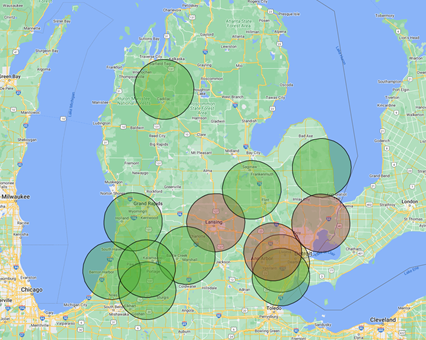
In the last decade, Michigan has taken in more trash than the previous year every year except 2020 and 2021, during the height of the pandemic. Last fiscal year, the state took in 52 million cubic yards of waste, enough to fill the state's largest landfill in a single year.
The increase is being driven in large part by Canadian rubbish (18.6% of Michigan's landfill intake in fiscal year 2022) and out-of-state trash (5%, largely Ohio, Indiana and Massachusetts), both of which increased in 2022. Michigan's homegrown trash went down just a smidge, a tenth of a percent, the same year, according to state figures.
Taking most of metro Detroit's trash are eight landfills in Wayne, Oakland and Macomb counties, including a large one on the Washtenaw-Wayne county border.
Together those eight report a capacity of around 155 million cubic yards. The facilities took 12.3 million cubic yards of waste last year, which gives the region around 12 years of space if trash volume stay roughly the same.
Landfills on the west side of the state have far more space, from Traverse City (430 years) to Grand Rapids (one with 41 years, another with 89 years) to Benton Harbor (48 years), according to state estimates released in January.
New state rules will make it even harder to get a landfill on a new site, said Margie Ring, a landfill engineer with the Michigan Department of Environment, Great Lakes and Energy.
“Because we’re trying to promote recycling instead of building new landfills,” Ring said.
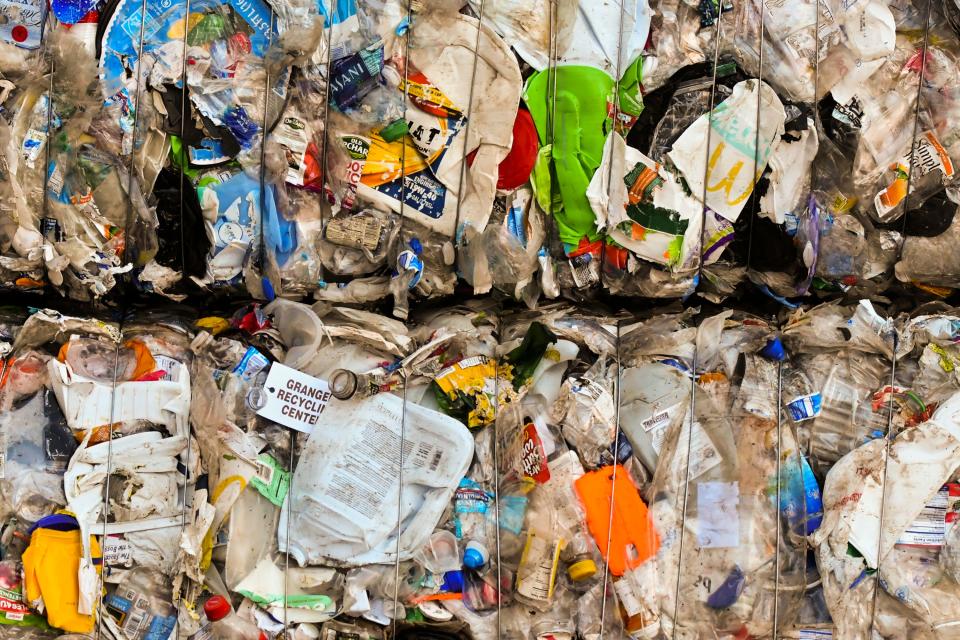
The new rules, stemming from a package of eight bills known as Part 115 of the Michigan Solid Waste Act, were approved in late 2022 and call for more detailed county plans for waste and linking landfill approvals to better recycling practices, among other recycling and waste changes.
The state agency is promoting two alternatives to new landfills: Less waste and expand the landfills that already exist.
Granger Waste Company is proposing to expand a former landfill in Watertown Township across from Chapin's home. It has been closed since 1985 and it could boost the Lansing region's capacity from less than 15 years to around 25.
Waste Management has proposed a $35 million transfer facility in metro Detroit. It is not a landfill but a place where dump trucks can unload waste that is sorted onto semi trucks that can take trash elsewhere in Michigan.
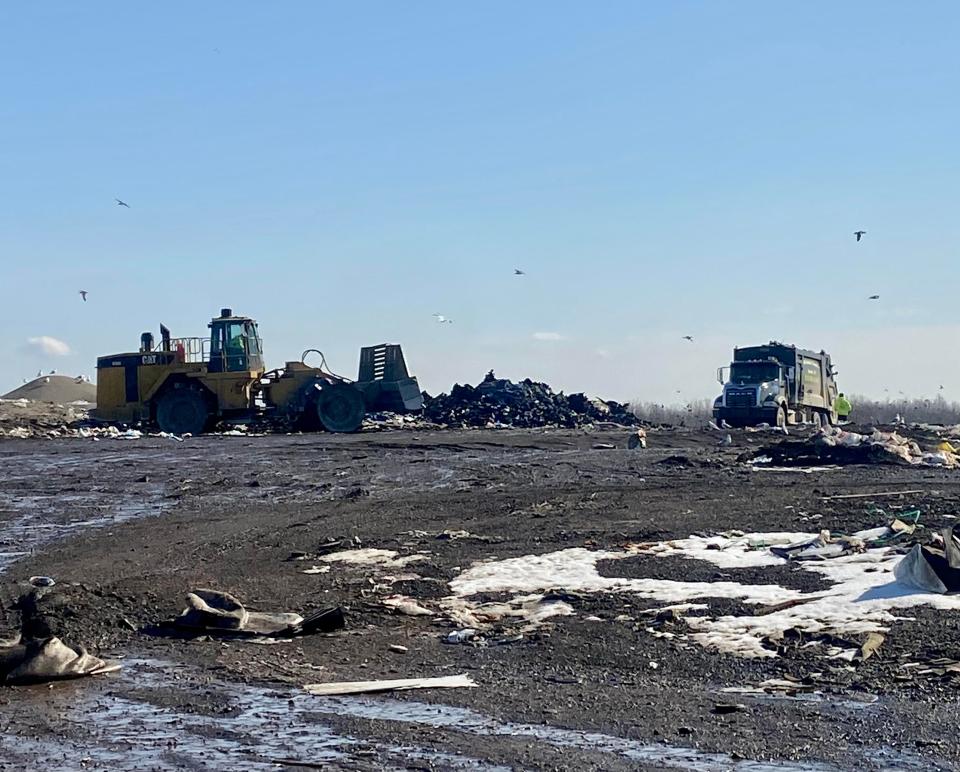
A landfill near Port Huron, the Huron Landfill, was expanded last year by nearly 2 million cubic yards of space, and went from two years of space left to more than two decades.
There are no landfills in Livingston County. Its trash is divided between landfills in Shiawassee County, Lansing and Washtenaw County.
Battle Creek is home to the C&C Expanded Sanitary Landfill. It is one of the state's largest and has one of the longest anticipated lifespans in the state with an estimated 90 years of capacity. There are several other landfills with decades of capacity within a 30-mile drive of Battle Creek.

When landfills start to fill up, operators tend to get creative and find ways to extend the life, like opening up old areas, finding new techniques or shipping waste farther away, Townsend said.
State regulators with EGLE do not track the amount of contiguous land a company may have connected to already-operating landfills, outside of what permits have already been approved. It's not clear how much land could be readily expanded at Michigan landfills but many of the ones near metro Detroit are already, or may soon be, landlocked, Ring said.
Expansions to handle capacity still will take time, said Mia Jankowiak, a spokesperson for Waste Management, which operates several of Michigan's largest landfills.
"Expansions are dependent on numerous factors and can take considerable time to appropriately prepare for from multiple standpoints," she said in an email. The company is "always evaluating innovative disposal solutions for our customers that include diversion from landfill and create infrastructure to drive circularity, like our intent to invest in a state-of-the-art materials recovery facility in City of Detroit."
Granger Waste Services operates the two landfills in the Lansing area. The proposed expansion of the closed landfill would be a third facility, on the same site as the existing Grand River Landfill. Spokesman John Zimmerman said, in an email, that the company hasn't looked at other contiguous space for landfills.
Zimmerman said the new state laws will hopefully reduce the amount of waste, "but when we do hit capacity, obviously there will be a need for additional space. There will always be a need for waste disposal in one way or another."
The trash has to go somewhere

The alternative to more, or bigger, landfills is to produce less waste or to ship it from metro Detroit and Lansing to the west side of the state.
It will cost more to send trash across the state, Gardner said.
Landfill capacity in Michigan
Infogram
It may be costly but companies often find shipping waste long distances to be cheaper than paying higher dumping fees in their own state, Townsend said. Massachusetts sends as much waste to Michigan as Indiana.
Michigan's average landfill tipping fee, the price someone would pay to dump a ton of self-hauled trash, is around $50 with Massachusetts being above $100, according to the Environmental Research & Education Foundation. The Northeast and Pacific areas are the costliest regions for trash, the South is the cheapest. Michigan is in line with the Midwest average of around $50, with the cheapest Midwest tipping fees being $38 in Ohio.
Townsend said companies that lean into the shipping trash solution will typically set up large-scale transfer stations where dump trucks can empty into semitrucks or rail cars and that can make long-distance dumping more economical, like the planned Waste Management facility in Detroit, which would be a hub for shipping waste.
Exactly how much a lack of landfill space would affect costs for customers is not clear because trash hauling rates vary widely and factor in fuel, labor, landfill tipping fees and wear.
Private haulers would still have to pay tipping fees at landfills. Michigan has a low tipping fee compared to Midwest states.
The other option: Waste less
![A garbage truck leaves the Ottawa County Farms Landfill in Coopersville, Michigan, Monday, July 8, 2019. [Matthew Dae Smith/Lansing State Journal]](https://s.yimg.com/ny/api/res/1.2/yXddnvfcJnHLoUbY8bPfsw--/YXBwaWQ9aGlnaGxhbmRlcjt3PTk2MDtoPTY1NA--/https://media.zenfs.com/en/livingston-daily-daily-press-argus/9f04d0969bb1162acf871f542378709b)
Michigan recycles about 18% of its waste. The national average is 34%.
There's room for Michigan to make big strides, said LeRoy Harvey, Meridian Township's environmental programs coordinator. He said gathering recyclables from residents can be more expensive than letting their trash go straight to the landfill.
"It can cost three to four times as much to recycle as it does to put it in a landfill," he said.
Gary Howell, a former Republican state representative from North Branch who helped to shepherd the recycling bills to Whitmer's desk last year, has said old state laws prioritized landfill capacity, which has led to cheap space and lots of imported trash. The new laws will help boost recycling, he added.
The new state laws give more financial support to recycling, and businesses are making private decisions to recycle at times when it's cheaper, such as selling waste cardboard, which should help improve recycling in Michigan, said Matt Flechter, a recycling specialist with the state's Department of Environment, Great Lakes and Energy.
Building or expanding more landfills is the wrong way forward, he said.
Michigan had, Flechter said, in the past overbuilt landfill capacity that led to cheap dumping prices. The state underinvested in recycling for decades as well, he said.
"Back in the day, a repair would fix it," Chapin lamented. "Americans, we don’t save. We throw away, we waste so much."
He believes landfills will be around as long as so much trash continues to be created.
"Everywhere is bringing it here," he said. "We’re gonna fill up here eventually and where are they gonna put it? Further up north? Where's it gonna go?"
Contact Mike Ellis at mellis@lsj.com or on Twitter @MikeEllis_AIM
This article originally appeared on Lansing State Journal: Michigan changing strategies for garbage as some landfills near capacity

